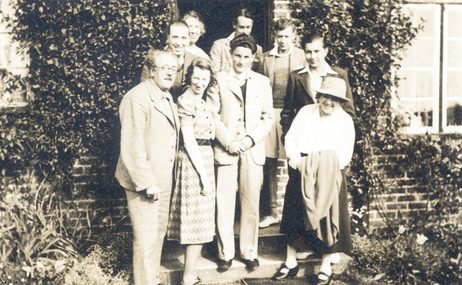Presented by Ben Vonberg-Clark
For our final Work of the Week film, we are looking at one of Britten’s most popular works: A Ceremony of Carols for high voices and harp. It was originally intended for women’s voices, but is very often performed by choirs of young singers who, as Ben Vonberg-Clark remarks in the film, relish the energy and tongue-twisters written into the text setting of the faster movements. The choice of harp as an accompaniment was fairly unusual at the time Britten composed it, but it has become part of the harpists’ staple repertoire now, and includes the evocative solo ‘Interlude’, which is based on the opening plainchant.
It is particularly apt that this work rounds off 2018, and not only because of its festive nature. During 2018 the focus at the Britten-Pears Foundation has been on ‘Britten in America’ – the theme of our annual exhibition and many events – and Britten composed this piece during the crossing back to the UK in April 1942. It seems almost bizarre that this spirited and Christmassy work was written on a rickety merchant ship (the MS Axel Johnson), as part of a naval convoy across the Atlantic, and vulnerable to torpedo attacks at any time. In letters to friends, he revealed he was ‘bored’ (rather than terrified) and to pass the time he re-composed A Hymn to St Cecilia – the first draft of which had been confiscated at New York customs – and several songs from A Ceremony ofCarols. He was certainly well-equipped for the latter: while waiting for the crossing at Halifax, Nova Scotia he had picked up a copy of the The English Galaxy of Shorter Poems and took the texts from there; and he had with him a harp manual, giving instructions on how to compose for the instrument. The reason for this somewhat esoteric publication was that he had not long before been considering a harp concerto for the principal harpist of the Philadelphia Symphony Orchestra.
The Ceremony of Carols marked his re-entry into British life after three years in the USA. He completed the piece over the next few months, and it was premiered in Norwich Castle on 5 December 1942, performed by the women’s voices of the Fleet Street Choir.


